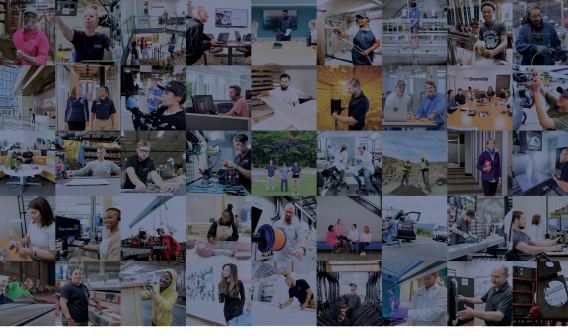Calkins: It does have the second-highest number of IT professionals in the United States, just after Silicon Valley, but most of those IT professionals are not private sector software engineers. We don’t traditionally have a giant software sector, but we are seen as a place where it’s possible to do software work and to build a software company. It’s also a place where ambitious, energetic people would like to go. This is a region in the United States that can attract that kind of talent, which helps us a lot.
You said a moment ago that talent was the No. 1 determiner of whether a region could host a growing startup software company. That actually might be changing. It’s possible that the location of talent is less important in a virtual age, so perhaps a local culture of investment that nurtures those companies might actually become more important.
Moret: I read that at one point you personally vetted every new hire at Appian. I assume that isn’t the case anymore, but how do you think that helped Appian in its early years, and how do you think that’s shaped the way you think about recruiting talent to Appian?
Calkins: Yes, I did. It was very important to me to personally interview all the candidates we hired because I felt from the beginning that culture was going to be the most important factor here, and I wanted to be sure we were accumulating a consistent culture — one that I wanted. I looked for a certain kind of a person. I didn’t think I could delegate that.
Secondly, it expressed my respect to each candidate. By making myself available to speak to them even in the process of getting a job at Appian, there is an implicit signal that they could speak to me later, too. I want to be open to comments. It created a very open culture where no one felt daunted to approach me because they’d all spoken to me already. I still try to encourage Appian to have an open culture where anybody can share their thoughts and disagree with anybody else.
I think a company’s DNA is determined by the first 1,000 or so people it hires. Our cultural DNA was just so important to me. Besides, we plan on growing a lot more, so whatever hiring decisions we make now and whatever culture we implicitly endorse are going to be multiplied as we grow. I want to be sure we get the initial model just right. For a long time, I considered one of the most important things in my job to do hundreds of interviews a year. Now I regret that I can’t do that many.
Moret: What do you see as the future of Northern Virginia as both a tech hub and as a location for other corporate headquarters? And what role do you think individual companies can play in helping to develop a sustainable tech workforce in the region?
Calkins: The transition I would most like to see Virginia make in terms of its software business is to be less of a satellite and be more of a headquarters. I’d like to have more Virginia-headquartered software companies. I know we’ve got talent here, but let’s not have all that talent work for somebody else’s firm. Let’s have some of them work for Virginia firms. We’ve got good ones, and many of us are striving to build more good ones. Given the talent of our workforce, we should expect to have our share of flagships and not just satellites.
Moret: Appian was at the forefront of the tech sector’s focus on low-code — offering existing building blocks of code to businesses to help get apps online more quickly. I think you’d agree that’s been a big driver of your success and growth. Can you elaborate on the benefits of that approach and how you see it evolving in the future?
Calkins: Low-code means drawing an application like a flowchart instead of coding it line by line. It makes an organization much faster to define its own patterns. It’s maybe 10, or even 20 times faster and, as such, it’s helping organizations to be agile and self-defined. It’s empowering them to be themselves.
Lately, organizations have never needed to be themselves more. They’ve never needed to react faster to change. This has all been a big test of our ability to change. There’s never been as much demand for corporate agility, and it’s been fascinating to be right in the middle of that.
Appian is a leader in the low-code market. We were the first company to go public as a low-code firm. We’re right in the middle of it. I love that, because it means we’re not just running a business, we’re pioneering an idea. We’re creating this concept and trying to deliver value through the concept.
Moret: Think about the last year for a moment. Obviously, it’s been an interesting and rather challenging year for most companies because of the pandemic. How has it impacted Appian, as well as your role as CEO?
Calkins: For Appian, it was a turning point that strengthened us. We figured out early on that we had strengths to spare, which is to say our business was virtualized pretty easily. We had the platform that was perhaps the world’s fastest way to build a new application. We saw the world struggling to adopt new patterns of behavior. Here we were, at once able to sustain our patterns and also possessed of an ability that others needed, and so we immediately turned our strengths outward and tried to help others.
We created an application that would manage COVID risk and keep people safe inside an organization. We gave it away. It was the most popular launch we’ve ever done. We had more than 1,000 companies download it. It was fulfilling to be able to use our strength in the midst of a crisis to help others.
Moret: One of the most interesting things I learned about you was that one of your chief hobbies, when you’re not running Appian, is board games — not just playing them, but also designing them — and I think doing both at a competitive level. What appeals to you about gaming?
Calkins: I’ve loved board games since I was about two years old. They always fascinated me. I like complexity, competition, and things that simulate history or real-world situations. All of these things draw me to board games. I like playing them competitively, partly because they give you excellent feedback. They teach you whether you’re doing well or doing poorly.
I like designing them because it trains me to take a complex real-world situation, like the war that unified Japan in the 1600s, and boil it down to a few important mechanisms that can be a good game. I think that’s a great exercise I enjoy very much. It’s about reducing a situation and then building rules and identifying causal relationships. Those are exactly the same activities you should be doing when running a company.
Moret: You’ve been here a long time in Virginia. What are your favorite places to visit in the Commonwealth?
Calkins: First, I love to hike. I’m a backpacker, so of course I like the Shenandoah Valley. There are a number of other places to hike around Virginia. The second top thing is my love of history. This is a state full of early American history, from the colonies and the Revolution to the Civil War. It’s just teeming with historical sites. All those sites mean more if you do a little research and understand the background.
Moret: Matt, we’re so grateful for you making time to visit with us. Is there anything else you’d like to share about Appian or Virginia?
Calkins: I’m proud of the way we’ve been able to grow for 22 years in Virginia. We’ve seen a lot change and had a good partnership with Virginia throughout. I feel like this region has given us everything we needed in order to be a successful firm. It’s always been my goal for us to be a contributing member of the community. I’m proud that we’re getting to the size where we can start doing that. It’s been a great partnership. I appreciate all that you and your colleagues have done to make this a great place to do business.
For the full interview, visit www.vedp.org/Podcasts





